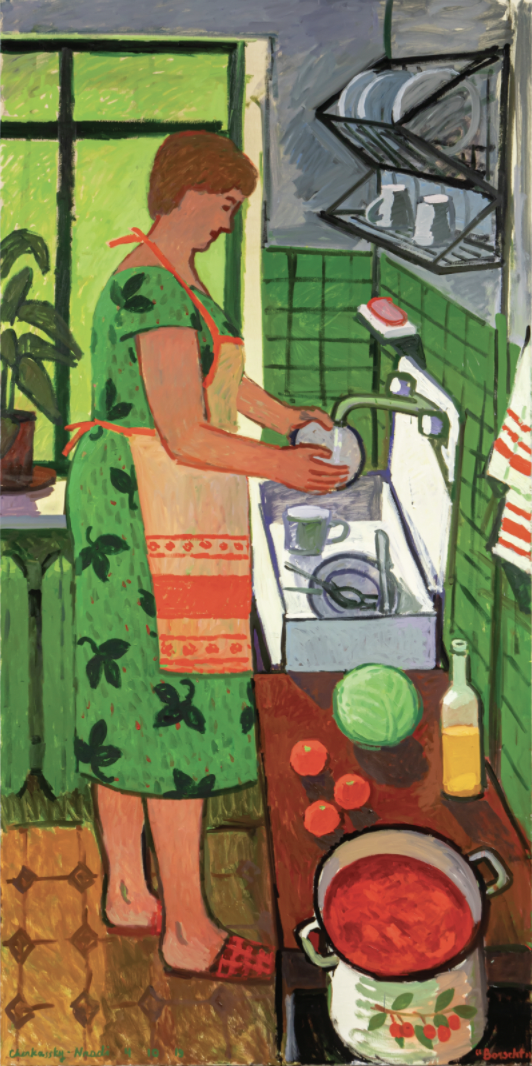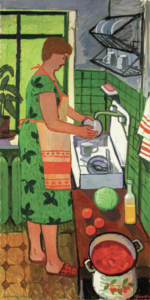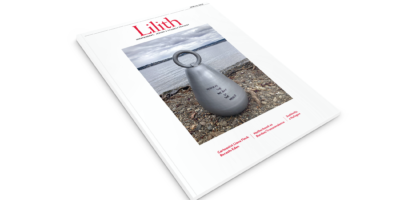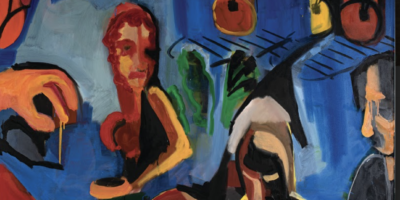
Fiction: The Taste of Mango

ZOYA CHERKASSKY
Last night Nadia’s daughter made her watch the SBS documentary, Russian Godfathers, about the flourishing mafia in contemporary Russia. It was the first time that Ellie, her little Avstraliyka, who usually spoke impatient English to her, had taken such an active interest in Nadia’s former country. And so she joined her lanky girl folded into some impossible yoga posture on the couch. The show had truly Shakespearean levels of drama, with tough men getting assassinated and their widows, clad in tiger-skin-patterned dresses, marrying the rivals. Nadia sliced a crunchy apple with a penknife and fed Ellie, who was too immersed in the documentary to refuse her mother’s attentions. Exploiting the moment, Nadia leaned over her daughter’s shoulder to inhale Ellie’s lemony odor. How odd it was to miss a person who was physically so proximate.
“Mum,” Ellie said with approval when Russian Godfathers was finally over, “you never told me Russia is so sick!” And, without waiting for Nadia to respond, she quickly assumed her usual position, hunching over her laptop. Nadia noticed that Ellie added a page that had something to do with Russia to her bookmarks. Was this a sign of a new understanding between them?
It was getting late, but Nadia couldn’t sleep. She circled the living room. She circled her daughter who, still at one with her Mac, was now wearing her headphones too, self-contained, unattainable, so at home within the unstoppable, glittering chitchat of the Internet: Angelina Jolie says Brad never loved her; silicon lips on special, already miles away from the world she’d just discovered. Nadia had never got used to this new, and in her view, not-so-brave, world where you could cross and re-cross the globe at the click of your fingers. Yet, paradoxically, it was this control over distances that made her daughter’s generation somewhat parochial in Nadia’s view. When you can go anywhere, you pause nowhere. You take in nothing.
That show, she wanted to tell Ellie, sure it was good entertainment, but she couldn’t relate it to her birthplace in any way. After she switched the tV off, there was an odd, abstract mourning within her, as though someone she once knew and hadn’t seen for a long time had just died.
At the kitchen counter she made a salad sandwich for Ellie’s school lunch and told her daughter that her own Russia, the one that vanished when the Iron Curtain had been lifted and they began showing bare breasts in the cinemas and selling travel packages to Hawaii, could not be screened as an action movie. To be understood in this cheerful kangaroo-land, Nadia’s story required too many footnotes—compulsory student allocations at universities, permits required for moving to live in major cities, the complexity of being the Jewish offspring of Mother Russia. When she first arrived in Australia and tried explaining where she came from, people used to nod sympathetically yet with such anxious vigor that it became clear her story was just as incomprehensible to them as the life-size dinosaur skeletons at the Melbourne Museum. Russian migrants were rare animals in this country already so removed from everything else in the world, with its head buried in its sand (constantly praised in the tourist brochures: the whitest in the world…). She now told Ellie that she had stopped speaking about herself as soon as she realized it only intensified her loneliness.
“Mum, do you mind? I’m trying to concentrate… and anyway, why talk to me in a language I don’t understand?” Click-clack her daughter’s fingers played, click-clack, and already the screen eagerly conjured up a phosphorescent dream from some picturesque corner of the world: the purple of nocturnal sea, the gold of bananas hanging heavily off palms. When she was sixteen, her daughter’s age, the most exotic place Nadia could think of was Moscow. And even that city was not a tangible place to her, but an echo of her father’s memory…
The schoolyard was illuminated by shy Siberian sunlight. June in Kemerovo was never lush, but there was a refined beauty in the summery sky, lightly dusted with shredded clouds, and in the wild grass dotted with flowers as pale and timid as the season—daisies, forget-me-nots, low bushes of lilac.
From a distance Nadia and her best friend, Ludmilla, could hear the chatter of their former classmates gathering outside the school, waiting for the final results to be announced. Someone called their names, but the girls remained where they were, locked within the immediate pleasure of their intimacy, delaying the future.
“I don’t think I’ll ever die,” said Nadia. She was sucking on the sweet end of a thick blade of grass. She had a gift for identifying the tasty parts of nature; even the most shrivelled green bird-cherries she picked had rich flavours. She was always sucking on something or nibbling something that no one else would touch. Nadia had learned to trust her choices.
Ludmilla was lying nearby on her stomach with her long, muscular legs swaying in the air: “How do you know?”
Nadia shrugged her shoulders: “I just know. Some things you just know. Do you really think someone could be so monstrously evil as to create such a beautiful world, let us get a taste of it and then end it all? Besides, our brains are too complex to just disappear.”
The orange fur of a squirrel flashed through the branches of an old pine.
“Nadka, you can’t be serious! You sound like… like those village babki who sneak into church services when they think no one is watching.”
“No way! No, I’m not like that. The Party is right, churchgo- ers are harmful elements in our society,” Nadia dutifully quoted from the school’s compulsory political updates. “Like Marx said, religion is the opiate of the masses. But… See, this is not about religion. It’s about biology. Apparently we only use about ten percent of our brain. I’m sure soon scientists will discover what happens to our consciousness after we die.”
“If you say so…” Ludmilla smirked and stretched on the grass, crushing a large constellation of daisies. “Listen, Nad, forget that stuff. I’ve got something to tell you. But you have to keep it a secret, right?”
“Sure.”
The girls moved to lie closer to each other. Their bodies brushed, creating an enclave of adolescent secrecy.
“Kolya and I… I touched his… perchik.”
“Did you?! How did it feel?”
“Well… strange, you know. A bit like… like when you touch a cat’s tail—you have to be really careful!”
They laughed with their mouths wide-open. A blind rain, as Russians called the warm drizzle when the sun was still high, had begun. Their staid school uniforms grew damp; the brown dresses clung close to their bodies, accentuating the arrows of their nipples.
“Hey, Nad, I think I prefer kissing…” They kept laughing. “But, you know, when he was playing his guitar for me yesterday, after I… nu, you know… well, he was singing this song about Marusya, how she betrays this thief that loves her…”
“Yeah, yeah, I know the song.”
“So he was singing and smiling just a little bit, with the left side of his mouth… you know, his hair falling just over his eyes…”
“Nu, and…?”
“…all I could think about was how I wanted to move that hair away. Because… because suddenly all I wanted was his eyes on me. It was… such a weird feeling, Nad. Can you imagine?”
Abruptly Nadia sat up: “I can’t believe it. You’re in love, Ludka!”
“I… you think so?”
“Oh, shit…”
“You really think so?”
“Listen, Luda, what about our plans?”
“We haven’t got our results yet…”
“Remember I told you that every year they allocate the three best students to Moscow University? So unless one of us has bombed out, obviously it’ll be us, you silly. And you know what? In Moscow you’ll meet other guys. They’ll be listening to Tchaikovsky, not singing dumb songs about women hanging out with thieves….”
Nadia plucked some lilac flowers, twiddling them between fingers that had turned light purple and bitter to taste: “Lud, just imagine this. You and me in Moscow… We’ll breathe the same air Lenin once breathed. We’ll go to see Hamlet at the Maliy Theatre. If we do well, the university will send us to Cuba, or somewhere, to fight the Americans. We’ll get work as English translators, maybe in intelligence.”
“Cuba…”
“Exactly! And if we get a job in Moscow, we’ll get a residency permit there. Think about it… My father says when he lived in Moscow he could buy flavoured soda water there, like cherry and lemon. Or even mango-flavoured soda, he said.”
“Mango! I’d kill to know what mango tastes like…”
“I read in this book… Jules Verne, I think… He wrote that mangos were sugary and soft. Sounds like kasha,” Nadia laughed. “But hey, forget Jules Verne, soon we’ll know for ourselves.”
“Lud! Nad!” The gangly Kolya, a guitar slung behind his shoulders, yelled from a distance. “The list is up. Come on!”
“Coming, coming!”
They sprang to their feet, facing each other: two strong profiles, one framed with a perky brunette bob and the other with long, butter-blond curls. They kissed each other po russki, forcefully on the lips, and walked towards the school.
The path leading to the school building was riddled with crispy snails and large emerald caterpillars rummaging in the wet earth. Eduard, Nadia’s father, carelessly crushed them all into white-blooded mess with his patched boots. What an atypical ruthlessness for the pumpkin-plump, easy going darling of Kemerovo, the head of the district’s university. He was respected not only as any ex-Muscovite would be in this little mining town, but also because of his packed lectures sprinkled with crude jokes. His ex-students, many of whom had meanwhile left Kemerovo, still wrote to him, even years later.
“She was definitely the first one we put on the list we sent to Moscow.” The school headmaster was sitting beneath a large portrait of Khrushchev, whom he strangely resembled, having the same potato nose and little hippopotamus-eyes. “They couldn’t possibly have chosen anyone else. There was no one better, you know yourself. If she can translate Shakespeare now, think of what she could achieve within the next few years… with a suitable education, of course. Don’t you worry, we’ll sort it out right now, Edik. I’ll call the head of the English faculty there. I know him personally. Here, take this receiver. You can listen to our conversation from this phone.”
Never again would Nadia see her father crying, the sparse drops on his unshaven, puffy cheeks, his agile green eyes (which she had inherited) frozen, staring somewhere beyond their book-lined living room which also served as her parents’ bedroom. Was he watching some distant past of his? More than once he had told her with his professorial eloquence about the sparkling marble of the arched Moscow metro, where thousands of Muscovites stalked its platforms like splendid predators in their gaudy, black market sourced jackets and bohemian berets, while the silver-sleek trains arrived and departed. The city became so vivid in her mind that sometimes she felt as if she’d already been there.
And those tears… Sometimes Nadia thinks they must have marked the end of her youth. Years later, by then in Australia, all she’d say to her own daughter would be: “They broke people there, you know, in that country.” And Ellie would look at her with irritation and say: “Oh, Mum, you’re such a drama queen…” and then run out in her light blue cotton school uniform—not as harsh to the skin as Soviet fabrics—to chase her own dreams involving foreign labels, not foreign places.
The vast geography lying between their hearts makes Nadia weep at night, the sound muffled into her pillows. She never cries in front of her daughter.
“Papa, you have to tell me what you heard. Otherwise… otherwise I’ll run away and you’ll never, ever see me again!”
“If you must know…” His tears had dried up, and only his funny, china-smooth crown remained red, as if he’d been sun- baking. “That Moscow dickhead… He said to your school head- master: ‘What did you expect, offering us a Yid? The university has a quota of half a percent for Jews. And we’ve filled it.’”
“I don’t believe you…”
But she did, because she saw him cry.
Later in the evening she peeped into the kitchen. Her father was talking to her mother: “They call our times the thaw, but I’m as freezing now as when Stalin was alive…” He rubbed his upper arms as if to warm himself, but her mother didn’t laugh.
Nadia missed the rest of that conversation; she was already on her way back to the schoolyard where at night the local boys got drunk on cheap, cherry-sour wine. Surely they’d spare her some.
Under the ancient, lumpy pine tree she asked the pimpled son of the neighbors: “Dima, can I touch your perchik…?” The wine worked quickly, diluting her mind; only one thought was still solid: Now that I’m stuck here forever, I’d better get used to the local girls’ favorite activity…
She didn’t stop even when she remembered that Dima wasn’t one for keeping secrets, and tomorrow all of Kemerovo would hear his excitable, slightly incoherent account of their rendezvous. Still, she kept groping in his baggy, muzhik’s blue pants with fingers that had never yet touched a male body, kept searching for his slobbery mouth with awkward lips that had never yet kissed.
His perchik felt like a boiled sausage and smelled the same. Dima shrieked (it was unclear whether with surprise or pleasure) while his three friends, far, but not too far away, poured wine down their throats, watching with great interest as the professor’s daughter explored Dima’s pants. One of them came closer, placing a hesitant hand on Nadia’s lovely bob…
Ludmilla, who like the ghost from Hamlet had a talent for appearing when you least expected her, came and crouched between Nadia and the boys: “Stop it right now! Now! Are you out of your mind?”
“Go away…” Nadia’s tongue felt slippery.
“Come on,” Ludmilla tried to pull her up. Nadia pushed her back, hard, but Ludmilla didn’t let go of her hand.
“Nadenka,” she said quickly, getting up from grass moist with spilt wine and God knows what else. “I’m not going to Moscow either. I’ve already told them.”
Told them…
“At least you had a choice… I didn’t. And anyway,” Nadia noticed Kolya, who in the meantime had been reasoning quietly with the drunken boys, “we both know you wouldn’t have gone in any case. You wouldn’t have left him.”
She finally got up and straightened the school uniform she was still wearing. This was the end of it all. Now she’d get away as fast as she could from Ludmilla. Ah, how she wanted to turn back, but she was smarter than Lot’s wife (yes, she had secretly read the Bible, just like the village babki). Instead she ran, because some intangible, unscientific evil had already risen between her and her childhood friend and there was no way they could get through it, back to each other.
At home Nadia found her father sitting alone on the low swing in their little garden patch, which all of Kemerovo’s residents were allowed to keep since there was hardly any fresh fruit and vegetables in the local shops during the Siberian winters. Eduard held a pipe between his large, yellow teeth and was looking through some handwritten notes; perhaps that long-discarded research he once used to do in Moscow, but who knew.
Nadia’s mother had forbidden her to ask her father why they had ended up in Siberia, but she wouldn’t have brought it up anyway. Why should she, when he seemed so content, so apt in his charming role as the local intellectual. Every little town, she thought now, still slightly intoxicated, needs its own intellectual. And if they don’t have one, then they import them from Moscow, even against their will.
No, even tonight she wouldn’t ask him the question, the answer to which she probably wouldn’t be able to bear anyway. But there was one thing she had to clarify. She pulled herself together and sat down on the ground slightly away from her father so that he wouldn’t smell her wine-breath.
“Papa, tell me, is it true what you said about Moscow, that they have mango-flavoured soda there?”
He puffed at his wooden pipe and offered her his usual sly smile: “No, dochka, I was only joking.”
They sat there for a while, listening to the rustle of squirrels dancing, wild as demons, amongst the trees and then, without speaking, they got up and walked into their rotting, wooden house which smelled of old books and cabbage soup.
Fourteen years later, when Khrushchev was already history and Brezhnev was exchanging thousands of his Jews for American wheat, Nadia was amongst those permitted to leave the country. She flew to Australia via Moscow. While waiting for her flight at the crowded airport, which she wasn’t allowed to leave even for a short excursion, Nadia bought a bottle of mango-flavoured soda from a woman so wrinkled that you’d need an iron to identify her features.
“Babushka,” Nadia asked, her palate so numb with nerves she couldn’t make out the flavour, “did you sell this kind of drink in the 1960s too?”
“Of course I did. And why wouldn’t I? Tell your people over there,” the old woman pointed at the long queue of Jews, clench- ing her lips, “that there is nothing you can’t get in Moscow. Tfu!” She spat on the ground through the slit of her silver-toothed mouth; Nadia could smell vodka on her breath.
Overtaken by a sudden, irrational panic, as though that frail woman might somehow prevent her from boarding the plane, Nadia dropped her bottle and hurried away, towards her people, who were meanwhile disappearing inside the plane’s belly, like Moloch’s children. The last words she heard before her departure was the old woman yelling: “And I’ll tell ya what: you Yids think you’re going somewhere better, but this is the best place in the world. Especially now that you’re all leaving!”
Nadia loves the intensity of Australian summer. The hot nocturnal air, dense as porridge, pushes its way through the open windows of their living room, carrying in the strong aroma of overripe apples from the garden. It’s time to bring the washing in, but Nadia doesn’t move, still caught in another space and time. And in reconsidering her attitude. Perhaps it is not such a bad thing for her child to be on close terms with the entire globe. Perhaps this way Ellie will grow up less disappointed, not duped by naïve fantasies like she once was, will preserve the confidence of her youth.
Her daughter switches off her laptop and comes over, puts her hands around Nadia, all affectionate now like a green-eyed kitten. Thank God for those eyes, and for her Slavic-high cheekbones; at least there’s something to remind Nadia this girl is hers.
Ellie pats her cheek: “Are you all right, Mum? C’mon, give us a smile… Now, that’s better. Hey, Mum, listen to this. Today in the class we talked about the idea of reincarnation. Nicole said it’s all New Age bullshit, but I was thinking, like… it actually makes perfect sense to me that I’ll… never die. What do you think, Mum? Oh, no, why are you crying again?”
Dr Lee Kofman is a Russian-born Israeli-Australian author of six books and editor of two anthologies, writing teacher and mentor based in Melbourne.




